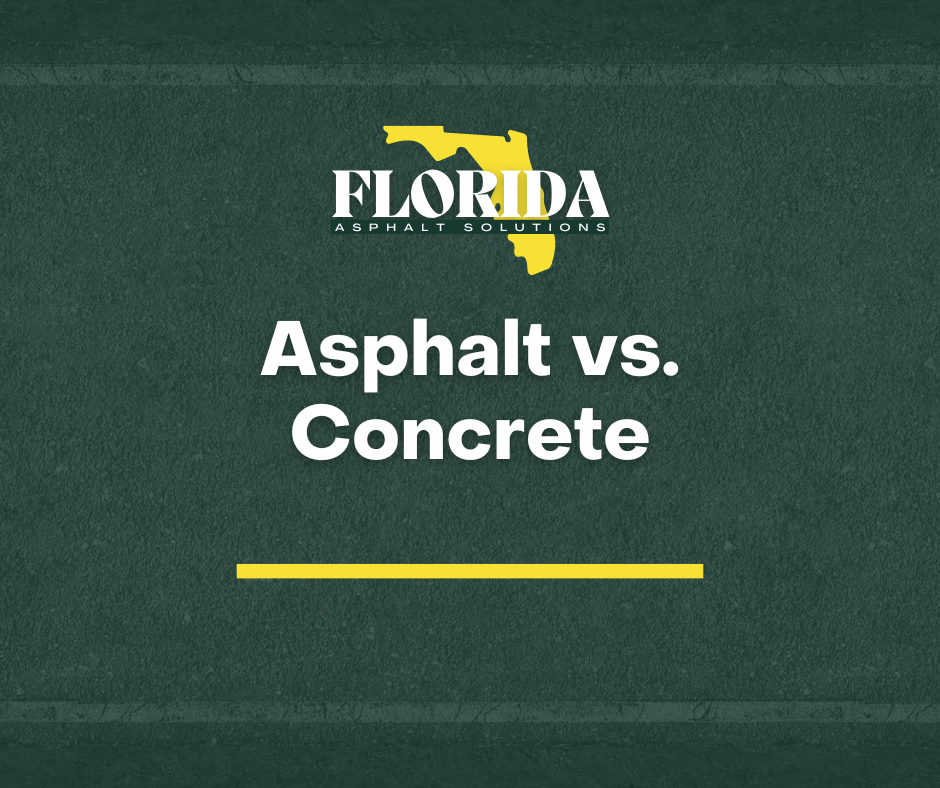
Asphalt vs. Concrete: What's the Best Choice for Your Florida Property?
Explore the benefits and drawbacks of asphalt and concrete for your Florida property. Our guide helps you make an informed decision based on cost, durability, maintenance, and how each material performs in Florida's unique climate. Get expert advice from Florida Asphalt Solutions today.
Introduction
When you’re considering a new driveway, parking lot, or patio in Florida, the two primary choices for materials are asphalt and concrete. Each material has distinct strengths and weaknesses, making the decision process quite a debate among homeowners and contractors. Florida’s unique weather conditions further complicate this decision. In this guide, we’ll explore these differences to help you make an informed choice about the best material for your property.
Understanding Asphalt and Concrete
While both asphalt and concrete are mixtures of sand and stone, the binder that holds these components together is what sets them apart. Asphalt uses a dark, sticky petroleum product known as bitumen, while concrete uses a mixture of cement and water. These distinct binders result in different characteristics, advantages, and disadvantages for each material.
Pros and Cons of Asphalt
Asphalt, celebrated for its resilience and cost-effectiveness, offers several advantages:
- Cost-Effective: Asphalt usually costs less than concrete to install.
- Quick to Install: Due to its quicker curing time, asphalt driveways or parking lots can be used sooner than their concrete counterparts.
- Flexible: The flexible nature of asphalt allows it to adapt to changing Florida temperatures without cracking.
However, it also has some disadvantages:
- Requires Regular Maintenance: Asphalt’s flexibility means it may require more frequent maintenance, such as sealcoating and patching, to maintain its appearance and longevity.
- Heat Absorption: Asphalt’s dark color absorbs more heat, which can make it uncomfortably hot to walk on during peak summer days.
Pros and Cons of Concrete
Concrete, on the other hand, is known for its durability and strength. Here are some of its advantages:
- Longevity: Concrete is a sturdy choice and lasts longer than asphalt.
- Heavy Load Capacity: Concrete’s strength allows it to withstand heavier loads, making it suitable for large vehicles or high-traffic areas.
- Stays Cool in Sunlight: Concrete’s light color helps it stay cooler in the sun, a potential advantage during Florida’s hot summers.
And here are the disadvantages:
- Cost: Concrete can be more expensive upfront and takes longer to install due to its extended curing time.
- Prone to Cracking: Due to thermal expansion and contraction, concrete can crack under fluctuating temperatures, requiring expensive repairs.
How Florida’s Climate Affects Your Choice
The Florida climate—hot, sunny weather, coupled with heavy rainfall—plays a crucial role in the asphalt vs. concrete debate. Asphalt, with its flexibility, resists heat damage and cracking but can become soft in extreme temperatures. Concrete, although susceptible to cracking from temperature changes, handles heavy rainfall well and remains cool under the hot sun.
Professional Maintenance and Repair Services
No matter which material you choose, professional maintenance can significantly prolong the life and enhance the appearance of your driveway or parking lot. At Florida Asphalt Solutions, we offer top-quality maintenance and repair services for both asphalt and concrete surfaces.
Conclusion
Choosing between asphalt and concrete depends on your budget, aesthetic preferences, load requirements, and Florida’s unique climate. Florida Asphalt Solutions is here to help you make the most informed decision for your property. Reach out to us today for top-quality installation and maintenance services.
